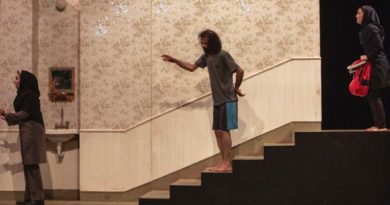“The Invisible Husband”, Teatro Manzoni, Milan
Maggie Rose in Lombardy
9 November 2022
Erba is one of the few contemporary playwrights in Italy to have enjoyed continuing success in his own country over three decades, but also to have been recognized internationally both elsewhere in Europe and worldwide.
In a country that could do more to nurture its playwrights, his achievement is more amazing. He is a versatile figure, writing for the stage and television, as well as directing and teaching playwriting in various universities and theatre academies.
Among his many plays, Marathon (Maratona di New York) stands out. It premiered in 1993 in Parma and has since been translated into 17 languages and played all over the globe. It had its London debut at the Gate theatre in 1999, in an acclaimed production, translated by Colin Teevan and directed by Mick Gordon.
A two hander, exploring the stresses and challenges of two men training for a marathon, the atmosphere grows dark as one of the men confesses that he no long remembers the route or where he is exactly. Today, Marathon, which is regularly revived, can be regarded as a classic play about the world of sport.
Erba is married to fellow actor Maria Amelia Monti and many of the lead roles in his work have been performed by her. Erba’s penultimate comedy, The Invisible Husband, (2021), is no exception. I caught the work at Milan’s Teatro Manzoni, when after a nearly three-week run, the theatre was at capacity, a sign of the playwright’s continuing popularity.
For this comedy, he has chosen an inventive format. Onstage we see two middle-aged friends, Fiamma (played by Monti) and Lorella (played by Marian Masironi), sitting at their computers, engaged in a Zoom call. High above the stage, two large screens show them in close-up. Their lively banter, centres on their love life – Fiamma complains about the boredom of married life and tries to console Lorella about her failure to find Mr. Right.
However, the dialogue comes to an abrupt halt as Lorella makes a surprising revelation: she has just got married. Then she drops a bombshell: the man she has married is invisible. This is Fiamma’s cue to increase her efforts to help her friend. She begs her to get a grip on herself, seek help in order to try to understand herself better, but Lorella is having none of it.
Another unexpected twist shows the Invisible man two-timing Lorella with Fiamma, who falls head over heels in love, quickly inviting him into her bedroom which is adjacent to her husband’s. This proximity of spouse and lover triggers further hilarity, but also engenders a much darker picture as the mysterious man proves totally elusive.
Using the vehicle of comedy, Erba has a knack of tapping into our deepest fears, and in this play he explores loneliness and isolation, feelings that many of us experienced during lockdown. Delving deeper, he also seems to be considering how this unprecedented period of isolation has affected our psyche.
In the final moments the two figures on the screen start to disintegrate, boding an even darker, perhaps tragic ending. Still I could not help feeling that the deployment of the large screens prevents audience members from fully engaging with the women’s plight. While on the one hand we are able to see their tiniest gestures and facial expressions, the screens overshadow the live performance of the actors onstage. In fact, the two women rarely move away from their computers, and any physical interaction is denied them. On the positive side, this is a choice on the part of Erba, the author and also director, which will allow the play, after its long and highly successful national tour, to be made available online immediately.









